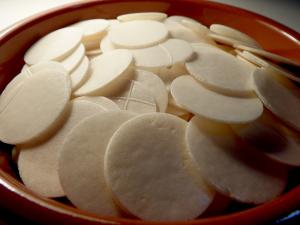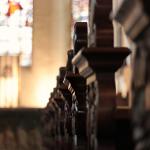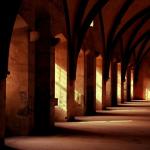I found myself inside an Episcopal church one Sunday morning last fall, partly an act of defiance, mostly an act of discernment. The particular church we were visiting stands just across the street from a major Catholic parish in town. It felt as though I were going inside the wrong building, and some kind of internal GPS screamed at me to reroute and cross the street. I had never had particularly good experiences at the Catholic church across the street. In fact, I mostly associated it with condescending and irrelevant homilies of an almost laughably neo-Scholastic bent, and a row of older women who would glare at me whenever my young children made a sound. The Episcopal church across the street, on the other hand, sported signs out front supporting refugees and held events combating racism. Without a doubt, the flavor of the Episcopal site held more obvious appeal (not to mention moral authority). But my need to explore went deeper than that: in the wake of a Trump victory in our nation (brought about in no small part by Catholic votes), and a white supremacist march in Charlottesville only months before (which was met with total silence in most Catholic churches), I felt conscience-bound to see if God was calling me to meet and work with Him in a different way.
Truth be told, I didn’t get very far. Our family stayed for the entire liturgy, the priest was friendly, the space beautiful, even majestic, but when I went to genuflect and realized there was no tabernacle, some sort of floodgate opened. I couldn’t hold back my tears. I realized that without that anchor of a tabernacle with the little red candle flickering next to it, indicating the Presence of the Body of Christ, I didn’t know where to look for God.
Now, this is a bit of a “duh” moment, right? — because if what I’m looking for is the Body of Christ, I really need look no further than to His people all around me, true? We are the Body of Christ. And I have no doubt that this is the case. God is present in His people, and if he isn’t, then we’re doing this Eucharist thing wrong all the way around.
But still, I felt the absence of that anchor of the Living God, that distilled presence of the One, the True, and the Beautiful, transforming that host and coming among us in humblest form. Yes, God lives within us, but he hasn’t completely taken us over yet, has he? On a good day, you may be able to see Christ in me, and I may see Him in you, but on my less good days, you really may just see a whole lot of sadness, snark, arrogance or fear. It may take some digging to get to the Christ in me.
Christ in the Eucharist, though . . . that’s like the essential oil of divinity. There’s no cutting through the preservatives, the gristle, the sin, to get to the God-portion. God is fully present, right there, in all His power, abundance, and saving love. (And you only need a taste, right, because partaking of Undiluted Majesty is powerful, and it can burn if applied too heavily to sensitive areas).
I needed that pure portion of God. I spent the day crying, totally unmoored by the morning, and headed back that evening to what felt like “the scene of the crime”: the Catholic church right across from the Episcopal one we’d worshipped in that morning.
I went in feeling as though I’d cheated on someone (the Catholics? God Himself? This particular congregation? I couldn’t be sure), but I slumped into a pew feeling instantly reconnected. It was the Feast of Christ the King, and the incense released for the occasion burned like healing fires over my skin and into my nostrils.
And I noticed how intensely grateful I was to be embraced by the sensuality. The music, the incense, yes, the Eucharist, the candle upfront telling me the tabernacle was full. It all washed over me as such gratuitous, abundant gift.
Now, don’t get me wrong–there were no big changes. The homily was boring and slightly condescending, the mural above the pews reading, “Sinners, weep for yourselves and your sins!” still spoke to me as heavy-handed and distancing from a loving God. But that merging of the material and the spiritual, that paradoxical play of the simultaneously mysterious and almost gaudy theophany of the Mass–that’s unlike anything else. It wrapped me up and I cried for joy. Suddenly I felt as though I knew my place in the Church like never before–beyond the homilies, beyond the unfriendly pew-mates, this place gave me an insta-connection to the Divine. I couldn’t not be Catholic if I wanted to. I’m a part of this on a cellular level, connected deeply to yes, the Body of Christ in His Catholic Church.
But on another level, the problems remain, right? Because though I am utterly convinced, both mentally and physically, that Christ is fully present in the bread and wine transformed at Mass, it’s a scandal and a betrayal to that same Body if we don’t show forth Eucharist in our own lives. Bread and wine transformed is nowhere near enough: they must transform us.
Our Gospel this week is the Bread of Life discourse. In the midst of the crowds, we hear Jesus proclaim,
“I am the living bread that came down from heaven; whoever eats this bread will live forever; and the bread that I will give is my flesh for the life of the world.”
We Catholics often get very triumphalistic about this statement, and the ones that follow. In our most violent and arrogant moments of proselytization, we talk about this passage as though we are home free, and all we really need to do is defend Christ in the Eucharistic bread and wine. We keep the host literally locked up in tabernacles, forgetting that the entire point of this Eucharistic host is distribution among the people. While the practice of Eucharistic Adoration is a beautiful and sacred thing, pope after pope has spoken to the beauty (and even necessity) of receiving, consuming, the Eucharist frequently. In our quest to honor this most sacred of gifts, we sometimes end up tempted to greedily hoard it instead.
And that’s not the way God’s self-gift works, is it? We read in the Old Testament about God’s people eating manna in the desert, literal food sent down from heaven. The Israelites are given everything the need, their daily bread, until they try to hoard it. They realize quickly that if they try to stash more than they need, their supply dries up. Their gratuitous gift goes bad and becomes inedible. Rather than serving their vitality and making them into who God calls them to be, the Israelites fearful and selfish little versions of themselves.
So too do we become small, greedy and fearful when we behave as though we (Catholics) are the only ones God feeds with Himself.
I recently had the privilege of attending a prayer vigil for racial justice at a local Baptist church. The vigil was held in the wake of the police killing of an unarmed teenager many in the community had known personally. It was profoundly humbling, to say the least, hearing this congregation come together in faith, holding in tension the honesty of their anger alongside hope in a Loving and Saving God. The way this community spoke straight to God, one-voiced in many voices, put me to shame and showed me a new kind of conviction. This was a people who hear and proclaim the voices of the prophets from the Old Testament, and know the message is for them. There was no tabernacle in that space, but the presence of the True and Living God was unmistakable.
Let us remember this Sunday, as we hear the Bread of Life discourse, that Jesus says not only “eat the flesh of the Son of Man and drink his blood,” but he also says, “Where two or three are gathered in my name, so too am I there.”
That is, we must not only consume the Eucharist on Sunday in church and call it an obligation fulfilled. We must manifest the fruits of such enfleshment, drinking the blood of hard political choices that lead to dignity for all people. We must drink the blood of humility and hard learning curves when it comes to hearing the voices of those marginalized in our society. We must allow the blood to stain our vanilla, middle-class values, so we can truly see and respond to the pain that’s around us, even when it’s uncomfortable, or “not the way we’ve always done things.”
Once we receive that Eucharist, we must gather as two or three in his name, and make real the world-shaking change the Body of Christ is meant to bring about: a new heaven and a new earth. Anything less is hoarding manna.
*****
Holly Mohr lives and works in Pittsburgh, PA, with her husband and two children. Together they try to build an authentic and meaningful life, built on gratitude to Christ and the challenging of conventional mores.













